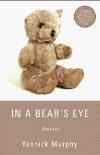In a Bear’s Eye
Twenty years after her first short story collection, Yannick Murphy returns to the form with In a Bear’s Eye, the follow-up book to her highly acclaimed 2007 novel Signed, Mata Hari. The stories contained within are spare and elegant, most clocking in at no more than four or five pages.
Twenty years after her first short story collection, Yannick Murphy returns to the form with In a Bear’s Eye, the follow-up book to her highly acclaimed 2007 novel Signed, Mata Hari. The stories contained within are spare and elegant, most clocking in at no more than four or five pages.
Fair warning: This is not the kind of fiction that holds the reader’s hand. The clues Murphy’s narrators leave behind do lead eventually to the heart of her stories, but even then they are more like trails of breadcrumbs than handwritten maps. Still, persistent readers will be rewarded with a book that eventually reveals a treasure trove of tiny, graceful moments filled with love and hope, chances for redemption, and rebirth.
The title story (which was selected for The O’Henry Prize Stories 2007 anthology) concerns a widow and her son struggling with their grief following the husband’s suicide. The boy is playing by a pond close to their home while a bear stalks through the apple trees nearby. Armed with her husband’s quailing gun, the mother stalks closer and closer, reliving her memories of her husband with every step she takes toward the bear. Murphy’s description of the husband’s suicide is particularly poignant:
He walked into the ocean one day and he did not stop walking. She liked to think he was still walking under the water. Skates stirred up sand and rose to the surface as he walked by them. Water entered his shirt cuffs and his shirt back ballooned. She and her boy sometimes talked about it. Her boy said how the hair on his head must be floating up and wavering like the long leaves of sea plants. Her boy said how his father must be reaching out to the puffer fish, wanting to see them change into prickly balls. His father must be touching everything as he walks, the craggy sides of mouths of caves where groupers lurk and roll their eyes, the white gilled undersides of manta rays casting shadow clouds above him. “My father must be in China by now,” the boy said to his mother.
The method of the husband’s watery suicide multiplies the mother’s anxiety at seeing her son trapped between the twin dangers of the pond and the bear. As she begins running across the field, the story follows suit, moving from meditation to conclusion in only a few paragraphs, fast enough for readers to feel the rush of adrenaline in the mother’s veins but long enough for the narrator and her boy to be suddenly healed, for the bear to transform from a sign of danger to a symbol of protection.
Elsewhere, Murphy continues to tap into similar veins of families, marriages, communities. In “Pan, Pan, Pan,” a family vacation is marred by a plane crash that is constantly on the news and coming up in conversation. The family’s young son obsesses over the crash, repeating the pilot’s last distress call over and over. The mother, worried for her son, becomes obsessed herself, but in such a way that the crash eventually represents all the dangers that might await her boy. When he briefly disappears, she runs wildly into the nearby lake looking for him, until she sees an owl flying overhead. She reveals a whole slew of emotions in that single sighting, saying, “It was just an owl, but for a moment I thought it was my son. He was all right. He had grown wings. He was safe. Already I was dealing with his death.”
Other notable stories include “Whitely on the Tips,” about a reclusive man who is suddenly thrust into the lives of his neighbors when a tree in a bordering yard is cut down, revealing the movements of the entire street to his living room window, and “Delaware,” a flash fiction about a man with his father’s ashes stuck on his shoe after throwing the rest off of a cliff.
If In a Bear’s Eye doesn’t reveal all of its secrets at first glance, it is perhaps only because those secrets are so important, so deeply rooted in who we are as individuals and as parts of our larger communities. Murphy’s writing trades ease of reading for depth of feeling, trusting us to be patient as she leads us to the locked door at the center of her stories, as she shows us which key to use to unlock the mysteries within. In the end, that is what she is offering us: mysteries in the deepest sense, universalities already written permanently upon our hearts. Yannick Murphy’s greatest gift as a writer is not just the way she reminds us of these feelings, but also the way she reassures us that they are still true.





